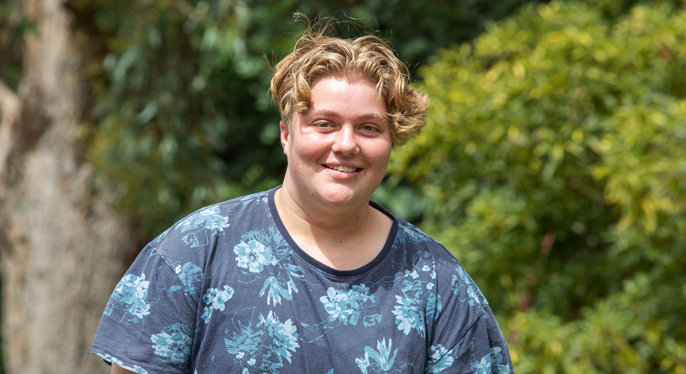Yorta Yorta woman and Year 12 student, Ruby Norman, says it took her a little while to find her niche at BSSC.
She experienced the change from Bendigo South East to BSSC as moving from the ‘top’ of the school to the ‘bottom’, and as a shy person found it especially daunting.
Enrolled in VCE subjects for Year 11, it took the better part of that year for her to fully recognise that the study program wasn’t working for her.
“I just felt a bit lost,” she says. “Now I’m in a VCAL program everything is working so much better. I’m definitely happier and more fulfilled at school.”
Ruby is also gaining invaluable experience in the area she hopes to one day have a career—and she hasn’t needed to leave school to do it. Thanks to the School Based Apprenticeship or Traineeship (SBAT) program, Ruby has confirmed the pathway she aims to take.
Each Tuesday she works and learns alongside the local staff of Parks Victoria. She is also studying a Certificate II in Horticulture through Bendigo-Kangan TAFE.
“I took on the TAFE course because eventually I want to work with Parks Victoria as an Indigenous ranger and one of the prerequisites is a Certificate II from TAFE,” Ruby explains.
Ruby spends most of her SBAT placement out in the field with Parks officers, extending her knowledge of local flora, fauna, geography and the needs of the country in the area.
Importantly, Ruby is also strengthening her connection to Country and understanding of her culture. And while it may not be Yorta Yorta Country, she knows how fortunate she is to have discovered a career pathway that connects her to the land.
A typical SBAT day for Ruby might include visiting a state park to check on or identify Aboriginal artifacts.
“I’ve found paintings, rock wells and scar trees,” she says, “and I’ve discovered so much about my culture that I didn’t know.”
Ruby’s placement has also taken her to the ‘coal face’ of devastation from the recent bushfires. She had the heart-breaking experience of watching koalas whose habitat has been burned, desperately searching for trees with foliage on them.
For Ruby, the local issues reflect a global problem: the extinction of species.
“If we’d continued to allow Indigenous people to manage the land we would not be facing these fires,” she believes. “And those who oppose regular burn-offs sometimes say it affects the animals—but what has now happened is ten times worse for the animals.”
Alongside these confronting experiences, Ruby’s time in the field is also giving her the chance to identify the Indigenous plants she is learning about in her horticultural studies. She is now constantly building her knowledge about the many traditional uses of Indigenous plants—from food, to medicine, to useful implements.
“This is what I love—to be out on country, looking after country, and whenever possible, being involved in Indigenous events and spending time with the Elders.”
But Ruby has not always taken her culture so seriously. The SBAT placement has been a part of an important process, deepening her connection to Australia and the huge community and family all around her.
“I feel like I’ve found myself,” she says.
Ruby dreams of establishing an Indigenous basketball team in Bendigo—drawing on her experience playing with the Bendigo Junior Braves.
She is also the great, great, granddaughter of Thomas Shadrach James (1859-1946), a man who committed his life to the education of Yorta Yorta and other Aboriginal children on the Cummeragunja Mission.
Back in the 1800s the Australian Government had legislated that Aboriginal children were only allowed to attend school up to Grade 3. They were then obliged to go to work.
James was a Mauritian medical doctor who developed an ailment that left him unable to continue his work as a surgeon after he came to Australia. A devoutly religious man with a love of music, he connected with the wonderful choir at the Cummeragunja Mission and then discovered the appalling restrictions on the education of Aboriginal children.
Thomas was invited by the community to become a teacher there.
At night, the kids would sneak out so he could continue their education by candlelight in what was known as ‘The Scholars Hut’. A great number of strong and effective activists were educated by Thomas Shadrach James through this ‘illegal’ project that became his life’s work.
Here’s part of the story based on research Ruby has done and told in Ruby’s own words:
To his great credit it soon became obvious these children were “better educated than those from the majority of state schools” … and visitors claimed they “never saw children more advanced” and noted how they could “read, speak and recite in public with assurance”.
‘The Scholars Hut’ room that we have at BSSC is named in honour of my great great grandfather. Being able to share the history of this room and being a direct descendant of Shadrach James is a feeling that’s just magical.”
BSSC’s ‘Scholars Hut’ in G-Block has become a great space for Indigenous students to catch up, keep ahead with their homework, or simply take some time out to kick back and relax—a perfect reflection of Thomas Shadrach James’ legacy.
Sue Pickles is BSSC’s Aboriginal & Torres Strait Islander Program Coordinator and someone Ruby cites as an important mentor for her as well as a great teacher.
“She’s someone who won’t stop until she is sure you have what you need,” Ruby says. “She goes above and beyond for the Indigenous students.”
However, Ruby still feels that much of Australia has a way to go in really getting a grip on, and being sensitive to, the deep hurts and injustice Aboriginal people have endured—and continue to endure.
“The classic one for me is: ‘You can’t be Indigenous, you’re too white’,” Ruby says. “I know it’s just ignorance—a lack of understanding—but it’s hurtful.”
Despite these disappointments, Ruby has a fantastic group of non-Indigenous friends as well as those she is particularly close to in the Aboriginal community. She reckons a few quality friends are more important than a crowd you aren’t particularly close to.
When it comes to heroes Ruby names Adam Goodes.
“He showed great courage standing up for himself and his culture, rather than just trying to protect his career,” she says.
Ruby also credits Sharnie Hamilton, who works locally with Parks Victoria, as an important mentor and teacher, “not only about the job, but also about life and my culture.”
“I’m trying to listen better these days,” she says. “I think we all need to listen more carefully to our Elders, teachers and parents—to people who have our best interests at heart and lots to teach us.
“I don’t think we are always aware how great our lack of knowledge can be.”
Given the chance to go back and give her twelve year-old self some of the wisdom she has collected over the last six years, Ruby would tell her to take every opportunity she’s given.
“And it’s okay to be you. Don’t try to make yourself fit in with the norms or expectations of those who don’t care for you deeply.”











